TWO BOOKS ON NAPOLEON.* IN the Growth of Napoleon Mr.
Young studies the environ- ment of the early life of the Emperor, and seeks to estimate the influence which it had on the formation of character, and to what extent it facilitated the foundation of the Napoleonic Empire. It is a notable piece of work, and for the first time opens up to English readers a most fascinating field of inquiry. The book shows great care in preparation, and evidences of wide reading and extensive knowledge on the part of the author. The style is clear, simple, and straight- forward ; and, though one may be permitted to disagree with some of the general conclusions arrived at, we cannot but admire the careful and painstaking way in which the facts are marshalled before us, and the lucidity and force with which the judgments are formulated.
The argument of the book gathers round two distinct and separate influences which were brought to bear on the early life of Napoleon. The first of these Mr. Young calls the " inherited environment," consisting of (1) Corsican birth ; (2) Corsican history traditions,—the continuous fight for freedom under the great patriots Gaffori, Sampiero, and Paoli ; (3) Corsican character; and (4) family traditions. From pre-Napoleonic sources we are able to discover the prevailing elements in the Corsican character. We find that the Corsicans are " brave, intrepid, dexterous, spirited and lively," but "proud, presumptuous, inconstant, choleric, cruel, and more superstitious than devout ; " that they are "extremely susceptible of the slightest touch of ridicule or insult " ; that they are "tormented by a desire to dominate " ; and that for war they entertain a favourite passion. In con- sidering these characteristics it must be borne in mind that Napoleon was not of Corsican but of Ligurian stock. Mr.
Young is probably correct, however, in placing more impor- tance on the Corsican training :—
" Although of Ligurian blood, being reared in Corsica, Napoleon acquired from his environment the Corsican qualities so valuable for a soldier—audacity, obstinacy, and guile. . . . . Napoleon acquired the Corsican form of insular tenacity—that instinct for ruse and audacity which the continual rivalry of families always produces in an isolated community—during the first nine years of his life, and strengthened it by visits to the island at the age of seventeen and upwards.'
The other important influence was the " personal environ- ment," which is carefully traced through childhood, boyhood, and early manhood. Great stress must necessarily be laid on parental training. Carlo Maria, the father, was a born intriguer. He was restless, ambitious, and discontented. Proud of his family, he created a feeling in his children's minds that the Bonapartes were of greater importance than was generally recognized ; and his close connexion with Paoli in his great fight for freedom must naturally have made a deep impression upon Napoleon. In this connexion one is reminded of the incident during the coronation ceremony in the Church of Notre Dame, when Napoleon turned to his elder brother and said, " Joseph, if our father could see us now I " The influence of the mother is more difficult to estimate. "Mothering," says Mr. Young, "is still an unex- plored science." We have, however, Napoleon's own words to guide us. At St. Helena he told O'Meara that it was to the manner in which his mother formed him at an early age that he principally owed his subsequent elevation. "My opinion is that the future good or bad conduct of a child entirely depends upon the mother." It is abundantly clear that Letizia. Ramolino waa a mother far above the average. She had a strong, determined character. She was able to impose her will upon Napoleon, if necessary, by a corporal correction which he has told us was an experience to remember. Devoted and unselfish, " tender and severe," she would put up with nothing unworthy.
But very little is known of the details of her influence, and because of that it would be unfair to impute the defects in Napoleon's character to her training.
In relation to the personal environment of Napoleon, Mr. Young spends considerable ingenuity to seeking to estab- lish that position in age and sex, relatively to the other
• (1) The Growth of Napoleon. By Norwood Young. London : John Murray. f 12e. net.]—(2) Napoleon and the Ind of the French Revolution, By Charles F. Warwick. London : T. Fisher Tawin. [8s. 651. net.]
nursery inmates, is, after the mother's personality, the chief factor in the development of a human being. Napoleon was a second son. He was a year and a half younger than Joseph, and two years older than his sister Maria Anna. According to Mr. Young, the eldest eon, having nobody to imitate, tends to become an indolent, self-satisfied, mild, and capable man, while the second son, in this case being followed by a sister, and having his brother in front, tends to become active, aggressive, and rude. We very much doubt the strength of such tendencies. In this particular case the difference in early training seems to us as likely a reason for the difference in characteristics, for we do not hold with Mr. Young that "at the age of nine the character is already in broad outline per- manently fixed." At all events, the mere fact of Napoleon being a second son does not appear sufficient justification for the following conclusion :— " Of the factors which went to furnish his extraordinarily apposite endowment, perhaps the chief of all was his position in age and sex in the Bonaparte nursery, especially in relation to Joseph. That gave him the first essential—the desire to succeed and to dominate."
We have no space to follow the author through Napoleon's early life, the early military training, his successive journeys from France to Corsica, and his experiences at Toulon and Paris. It is a restless period marked by poverty, hard work, incessant reading, awakening ambition, untiring energy, and, finally, extraordinarily good fortune. " Luck," says Mr. Young, " gave Napoleon an extraordinary chance at Vendemiaire ; a command when he was unknown and untried; a decisive advantage in education over French rivals ; an army superior in activity, spirit, and tactics to the foreign armies a freedom and independence which no French rival or Continental opponent ever had before Waterloo."
Good fortune, however, does not explain everything. Some- thing more was wanted to make the Napoleonic Empire possible —Genius. It may be granted at once that inheritance and en- vironment are powerful factors in the formation of character. They perfect the instrument for the work. But they do not explain genius. In addition to the influences of environment, Napoleon brought something of his own. He brought—at least in the early years of his Empire—an unerring judgment, a sense of vital power, and a driving and compelling dynamic force. " Napoleon's genius was military," says Mr. Young, and, judged by results, his military genius was unsurpassed. To the civilian he appears the greatest of all soldiers, and he has enlarged for all time our conception of human fame and human possibility.
In Napoleon and the End of the French Revolution we have a sequel to Mr. Warwick's works on Mirabeau, Danton, and Robespierre and their part in the French Revolution. The Revolution ended in chaos, and Napoleon, who was no Revolu- tionary, stands in history as the repairer of its errors and the rebuilder of its ruins. He found the crown of France in the mire, and with the point of his prevailing sword he picked it up. To turn from The Growth of Napoleon to this book is to lay down the scalpel and take up the brush. Mr. Warwick paints once more for our gaze the story of Napoleon's life in bright and vivid colours. The book has been brought well into touch with modern research ; it suffers necessarily from compression, but from the Russian campaign the story goes well. It is a work primarily for the general reader. There is an entire absence of notes, and reported sayings are occasion- ally elevated into historic facts. It is embellished with many illustrations, some of which have never before been published.











































 Previous page
Previous page